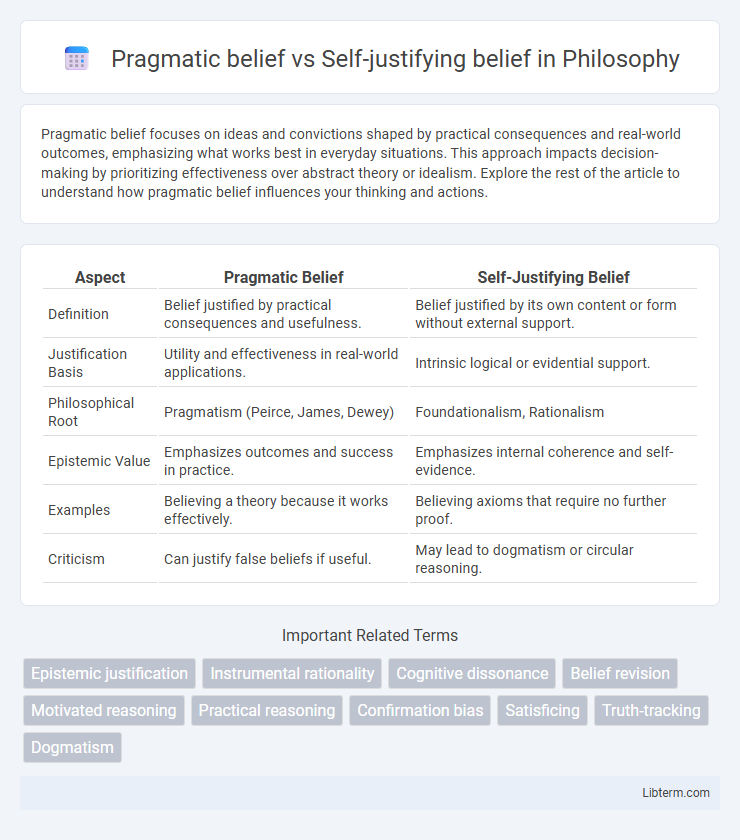Pragmatic belief focuses on ideas and convictions shaped by practical consequences and real-world outcomes, emphasizing what works best in everyday situations. This approach impacts decision-making by prioritizing effectiveness over abstract theory or idealism. Explore the rest of the article to understand how pragmatic belief influences your thinking and actions.
Table of Comparison
| Aspect | Pragmatic Belief | Self-Justifying Belief |
|---|---|---|
| Definition | Belief justified by practical consequences and usefulness. | Belief justified by its own content or form without external support. |
| Justification Basis | Utility and effectiveness in real-world applications. | Intrinsic logical or evidential support. |
| Philosophical Root | Pragmatism (Peirce, James, Dewey) | Foundationalism, Rationalism |
| Epistemic Value | Emphasizes outcomes and success in practice. | Emphasizes internal coherence and self-evidence. |
| Examples | Believing a theory because it works effectively. | Believing axioms that require no further proof. |
| Criticism | Can justify false beliefs if useful. | May lead to dogmatism or circular reasoning. |
Understanding Pragmatic Belief
Pragmatic belief involves accepting ideas based on their practical outcomes and usefulness rather than solely on factual accuracy, emphasizing functionality in decision-making processes. Self-justifying belief occurs when individuals maintain beliefs by generating justifications that reinforce their existing viewpoints, often disregarding contradictory evidence. Understanding pragmatic belief requires recognizing how experiential success and real-world applicability influence the acceptance and persistence of certain ideas over purely theoretical validation.
Defining Self-Justifying Belief
Self-justifying belief refers to a cognitive framework where individuals maintain beliefs by generating reasons or evidence that support the belief itself, often overlooking contradictory information. This belief type creates a closed reasoning loop, reinforcing the idea regardless of external validation or logical scrutiny. Pragmatic belief, in contrast, is based on the practical benefits or outcomes of holding a belief, but self-justifying belief centers on internal rationalizations that defend the belief's validity.
Core Differences Between Pragmatic and Self-Justifying Beliefs
Pragmatic beliefs are formed based on practical outcomes and real-world utility, emphasizing effectiveness and usefulness in guiding behavior. Self-justifying beliefs, however, are maintained primarily to preserve self-esteem or avoid cognitive dissonance, often ignoring contradictory evidence. The core difference lies in pragmatic beliefs being outcome-driven and adaptable, while self-justifying beliefs resist change to protect one's self-concept.
Psychological Foundations of Belief Systems
Pragmatic beliefs are grounded in practical outcomes and adaptive functions, shaping behavior through experiential evidence and utility in real-world contexts. Self-justifying beliefs, by contrast, serve to maintain internal coherence and protect self-esteem by rationalizing existing attitudes, often resisting contradictory evidence. The psychological foundations of belief systems reveal these dynamics as mechanisms for cognitive consistency and emotional regulation within human thought processes.
Practical Applications of Pragmatic Beliefs
Pragmatic beliefs, foundational in cognitive-behavioral therapy, emphasize adaptable thought patterns that promote effective problem-solving and decision-making in real-life contexts, enhancing resilience and goal achievement. These beliefs facilitate practical applications such as improved stress management, adaptive coping strategies, and heightened motivation by encouraging individuals to align their perceptions with functional outcomes. In contrast, self-justifying beliefs often reinforce irrational or maladaptive behaviors by rationalizing failures or negative patterns, thereby limiting personal growth and psychological flexibility.
Risks and Pitfalls of Self-Justifying Beliefs
Self-justifying beliefs pose significant risks, including cognitive biases that reinforce errors and hinder objective decision-making. These beliefs often lead to confirmation bias, impairing critical thinking by dismissing contradictory evidence and fostering rigidity in perspectives. The pitfall of self-justifying beliefs is the entrenchment of false assumptions, which can escalate conflicts and reduce adaptive problem-solving in dynamic environments.
Impact on Decision-Making Processes
Pragmatic beliefs, grounded in practical outcomes and real-world consequences, directly influence decision-making by promoting actions that yield effective and beneficial results. Self-justifying beliefs, however, often bias decision-making processes by reinforcing existing viewpoints to avoid cognitive dissonance, potentially leading to flawed or suboptimal choices. Understanding the interplay between these belief types is crucial for improving critical thinking and adaptive strategies in complex decision environments.
Pragmatic Belief in Professional Settings
Pragmatic beliefs in professional settings emphasize practical outcomes and utility, guiding decision-making based on what works effectively in real-world scenarios. These beliefs prioritize efficiency, problem-solving, and adaptive strategies that align with organizational goals and improve performance. Unlike self-justifying beliefs, which seek to defend existing views, pragmatic beliefs evolve through experience and evidence to support continuous professional growth and success.
Overcoming Self-Justifying Belief Bias
Overcoming self-justifying belief bias requires recognizing the tendency to rationalize decisions to protect self-esteem, which often distorts objective assessment. Pragmatic belief emphasizes beliefs that are useful and adaptable, encouraging flexibility and openness to new evidence, thus counteracting rigid self-justification. Effective strategies include mindfulness, seeking external feedback, and fostering critical thinking to break the cycle of biased reasoning.
Cultivating Healthy, Flexible Belief Systems
Cultivating healthy, flexible belief systems involves distinguishing pragmatic beliefs, which are adaptive and result from practical experience, from self-justifying beliefs that resist change and defend existing biases. Emphasizing openness to new evidence and critical self-reflection supports the development of pragmatic beliefs, enabling individuals to adjust their worldview for improved decision-making and emotional well-being. Promoting cognitive flexibility reduces dogmatism and enhances resilience, fostering more balanced and rational thought processes.
Pragmatic belief Infographic

 libterm.com
libterm.com